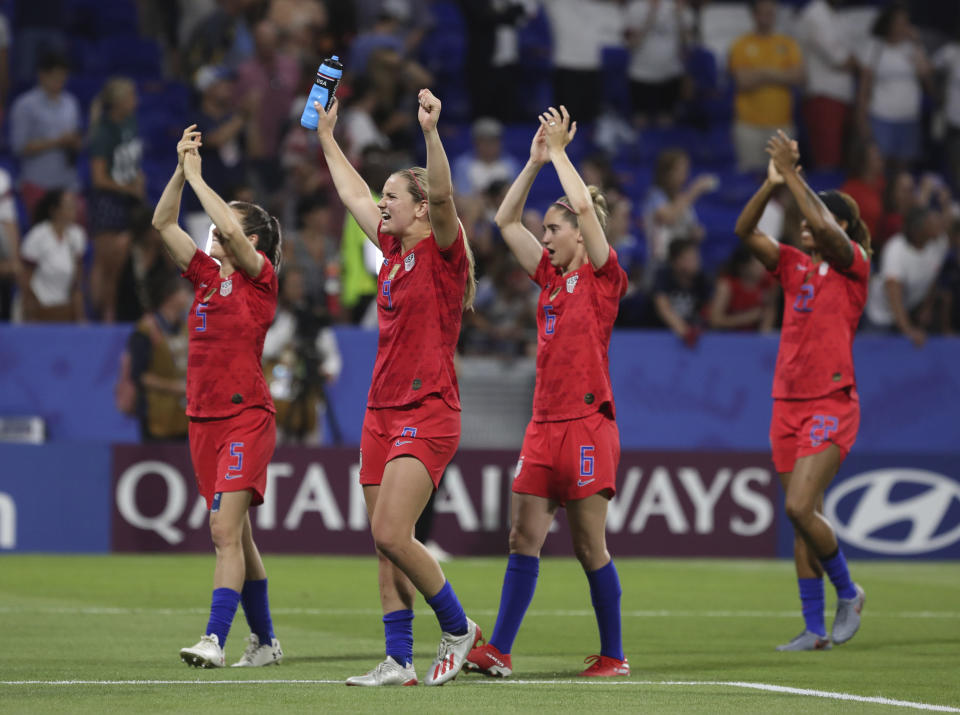The match that had everything: USWNT's win over England a showstopper

This game had everything. It was a kind of supernova, giving us beauty and violence and chaos in a long, fine flash.
And at the end of it, the United States women’s national team had qualified for its third straight Women’s World Cup final. Just as England, vanquished 2-1 in Lyon, France, on Tuesday, fell a game short of the title match. Just as it had in 2015. Just as it had in the 2017 Euros. Just as its men’s team had at its own World Cup last summer.
But first, everything.
An England team, casting around for any grounds to play the victim, and finally finding it in the most innocuous of offenses: the Americans checking out the English team hotel, which FIFA had already assigned to the winner of the game for Sunday’s final. U.S. Soccer was doing its due diligence, but it was enough for Lionesses manager Phil Neville to claim that the Americans had committed some cardinal sin. Drama in the build-up? Check.
A pregame controversy in the form of Megan Rapinoe’s unexplained benching, later reported to be a hamstring injury. At the time, the federation wouldn’t say whether it was that, or a tactical decision, or what. Intrigue at a fever pitch? Check.
A message-sending nutmeg from the unchained Rose Lavelle, the first of several times she would carve up the English.
An early goal from Christen Press, the quiet replacement for Rapinoe, with a splendid header from Kelley O’Hara’s deep cross after Lavelle’s majestic stepover.
A posterizable save from Alyssa Naeher, soaring to a deep England shot for a splendid save.
Ellen White with a peerless finish to equalize, a dink after she escaped Abby Dahlkemper and Becky Sauerbrunn, and not for the first time on the night, of such perfection that it almost looked accidental.
Alex Morgan’s winner, on yet another floated ball into the box from Lindsey Horan, finally restored to the starting lineup.
And then the tea-sipping celebration to mark Morgan’s 30th birthday and predictably annoying the opposing nation of tea-fundamentalists.
Who did it better 🤔 pic.twitter.com/RX43mwz55W
— Yahoo Soccer (@FCYahoo) July 2, 2019
There were crunching tackles. There were flying elbows.
There were stepovers and more nutmegs, too.
There was a White equalizer called off by the Video Assistant Referee after she’d slipped the American center backs yet again, only inches ahead of their line.
Missed it by *that* much 🇺🇸🏴 pic.twitter.com/rxOUZwnKqG
— Yahoo Soccer (@FCYahoo) July 2, 2019
There was White’s late whiff on a door-step finish, caused by Sauerbrunn’s light contact. VAR awarded the penalty kick. Because VAR giveth, and VAR taketh away.
But Naeher saved the soft Steph Houghton effort, in repudiation to all those questions of whether she was up to replacing the ostracized Hope Solo.
Finally, a red card when Millie Bright was sent off for a second yellow with a studs-up challenge on Morgan.
Check. Check. Check. Check.
It was all there.
It was all the narratives, rolled into a single game. One momentous, magical, magnificent game.
Was it the prettiest game the U.S. has ever won? Was it its best team performance?
No. Of course, it wasn’t.
But it was gutsy. Gutsy and glorious.
A celebration of the game of soccer. And in that sense, it also felt apt. And poignant. Because in these teams’ respective heritages, they encompass the struggle and difficulty of the women’s game as a whole. The underfunding and the outright sexism. The century of strife to get to this point, where transcendent, pulsating games like this one can exist.

Women’s soccer was popular in England for almost as long as the men’s game was popular. But after World War I, when the women’s game had spiked in popularity in the absence of good men’s soccer, the Football Association, in its ignorance and misogyny, panicked and banned women from playing competitively on any field associated with the governing body – which was, of course, almost all of them.
The ban on the women’s game lasted until 1969. It would take until 1993 for the FA to finally begin administrating the women’s game. Those are the obstacles the Lionesses had to overcome to get to this stage, to this soaring peak of the sport, in the country that codified the modern incarnation of the game of soccer, no less.
The Americans, of course, owe their dominance to a piece of legislation, slipped into a larger bill, that guaranteed proper funding for women’s sports in schools and colleges. Title IX changed everything, eventually. Without it, it’s likely that none of this happens. That the Yanks don’t find themselves on the verge of a fourth World Cup title.
One team banned from playing for nearly half a century. Another that needed major legislation just to give it the tools it needed to compete and then dominate. Playing a spellbinding game of soccer.
Because sometimes soccer has it all.
Leander Schaerlaeckens is a Yahoo Sports soccer columnist and a sports communication lecturer at Marist College. Follow him on Twitter @LeanderAlphabet.
More from Yahoo Sports:


